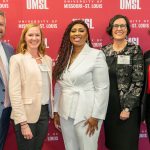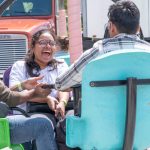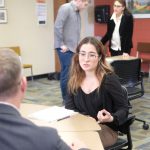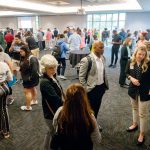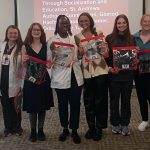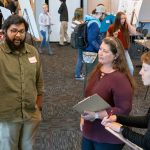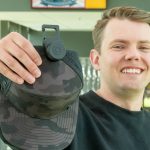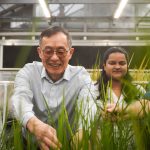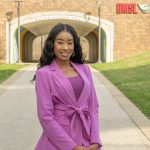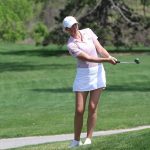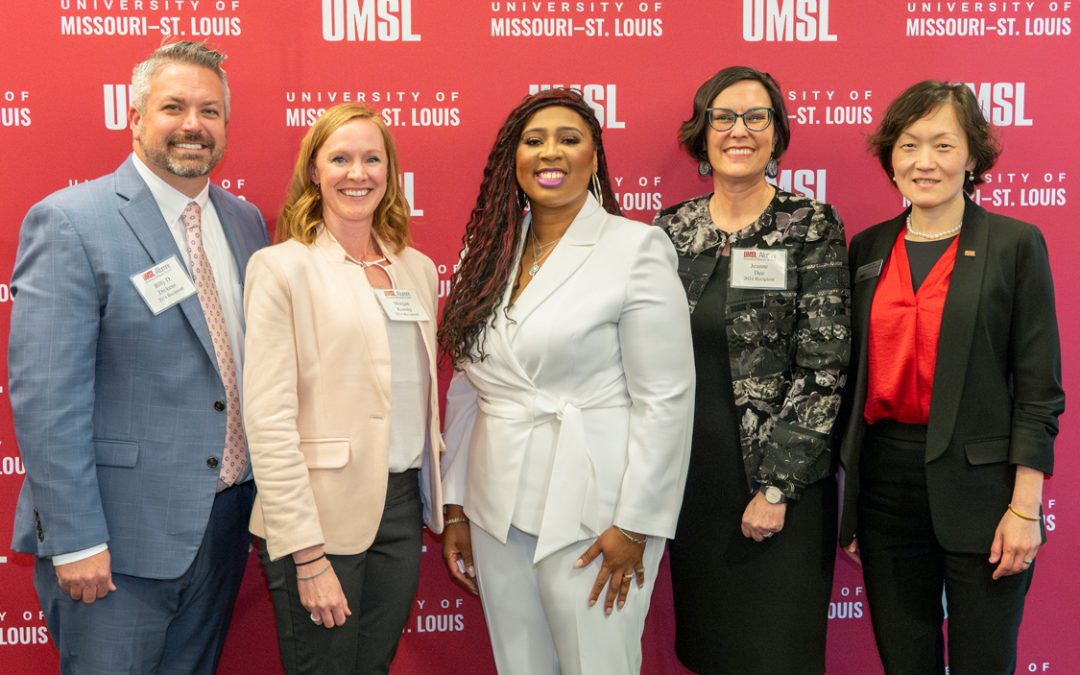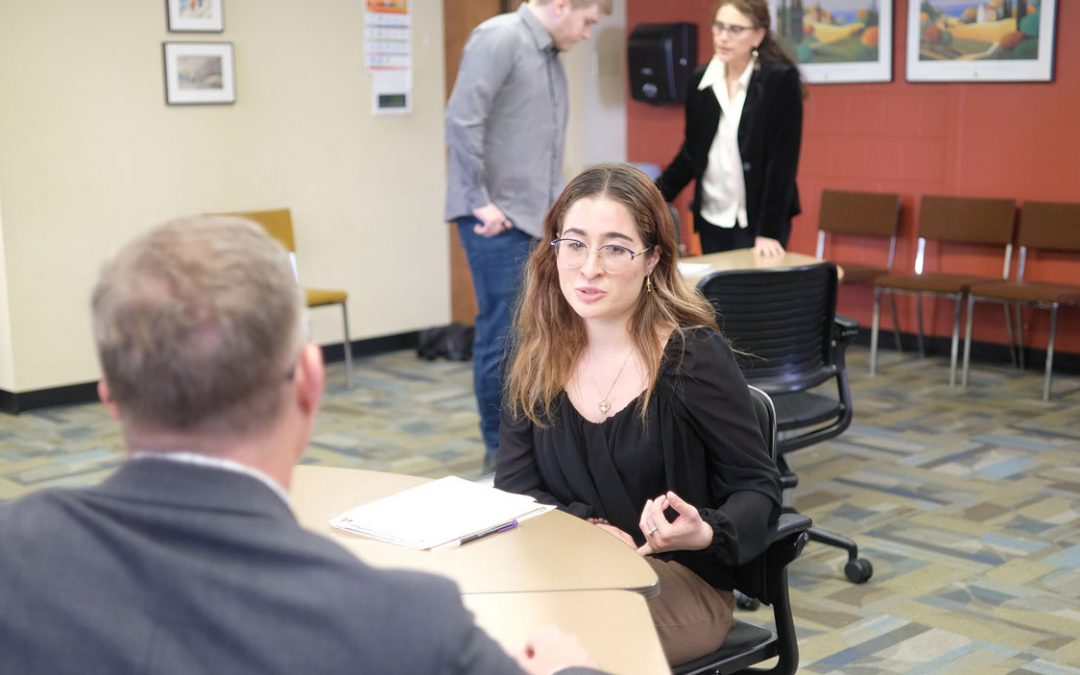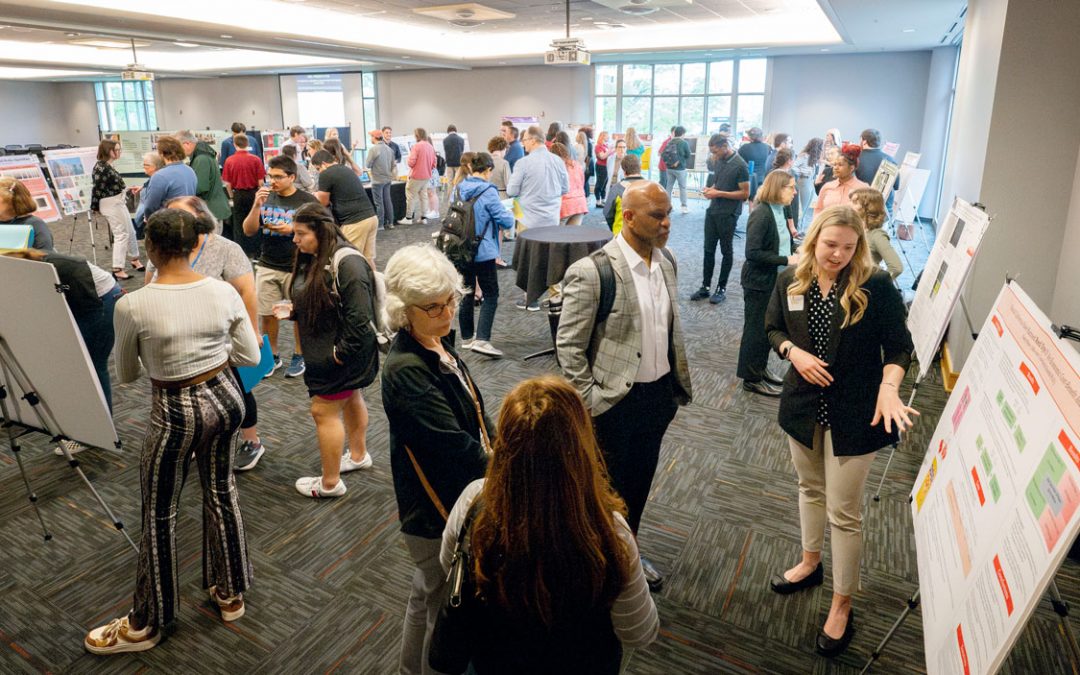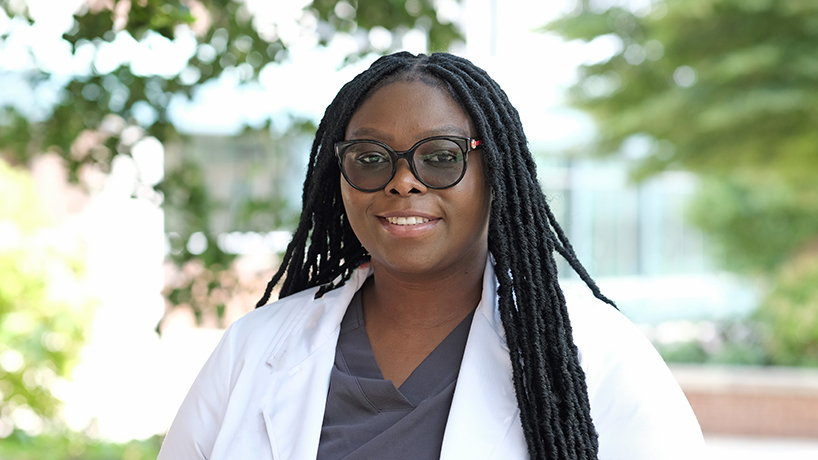
College of Nursing DNP student Ayomide Aruwajoye was named one of five inaugural recipients of the Loretta Ford Centennial Scholarship. The American Association of Nurse Practitioners established the scholarship in December 2020 to honor Loretta C. Ford, who helped create the curriculum for the first nurse practitioner program in 1965, thus establishing the profession. (Photo by August Jennewein)
When Ayomide Aruwajoye first started thinking about what she wanted to do with her life, her mind flashed to her father, a pastor.
She’d spent her life watching him put together programs to help homeless people or members of the church.
“It’s just the way my family is,” she said, noting her mother’s childcare profession. “We want to help or figure out how to heal in different types of ways. I fell in love with health care and the dynamic of taking care of people.”
That interest in helping others led Aruwajoye to the College of Nursing at the University of Missouri–St. Louis, where she earned her BSN in 2017, then to the DNP program, where she’s now just a year away from completing her advanced degree.
Last month, her journey to becoming a nurse practitioner received some unexpected help when she was named one of five inaugural recipients of the Loretta Ford Centennial Scholarship.
“I found out during a very emotional time because I was going through a lot with trying to find finances for school,” Aruwajoye said. “I opened my email and saw congratulations. I read it like 13,000 times, and I cried because I was so overwhelmed.”
The American Association of Nurse Practitioners established the scholarship in December 2020 to honor Loretta C. Ford, who helped create the curriculum for the first nurse practitioner program in 1965, thus establishing the profession.
The one-time $10,000 in scholarship funding is intended to help the awardees in their pursuit of their degrees and improve patient care. The AANP choose the scholarship recipients on the basis on their personal stories and aspirations.
Aruwajoye discovered the scholarship only three days before the application deadline and worked with Executive Director for Graduate Practice Programs Cathy Koetting to put together a strong application.
Reading about Ford inspired Aruwajoye.
“Here goes this amazing woman who’s done so many different things, so many amazing things and she’s 100 years old and she’s still setting a path for other nurses to aspire to, to want to be better and come up with these wild dreams to change health care,” she said. “I think that that’s amazing.”
She also found herself struck by the personal scholarship questions themselves.
She wrote about the difficulty of working as a dialysis nurse throughout the coronavirus pandemic, about her father’s struggle with pancreatic and colon cancer and managing the emotions of having a parent have a health care issue while in a difficult academic program.
Then Aruwajoye discussed a dream she shared with her father: their 10-year plan to open a nursing school in Nigeria, her father’s birth country.
“He talks a lot about the changes he wants to make in their schooling system,” she said. “With my medical background, we’ve talked a lot about possibly opening up a nursing school and being able to teach better health practices. In America, we’re blessed that we have opportunity to learn, but over there, they don’t have those types of opportunities.
“My father always motivates me to be the best version of myself. He gave me the push to do the program and progress in life and work to make things better for other people.”
She’s already started helping people as a dialysis nurse for Fresenius Kidney Care.
When she was an undergraduate, Aruwajoye found nephrology to be one of her most difficult classes and never imagined she’d go into the field. But then a woman in church encouraged Aruwajoye to try out the profession.
“She kept telling me, ‘You have the personality of a dialysis nurse,’” Aruwajoye said. “I took a leap of faith, and it’s really been one of the biggest blessings in my life. I’ve been a dialysis nurse for three years now, and I’ve learned so much and worked in so many different environments.”
One unexpected benefit for Aruwajoye has been the ability to work in various states and medical facilities.
“I work in mitigation, so I’m usually bouncing around everywhere,” she said. “Missouri is a compact state, so I was able to work in California, Philadelphia and Boston under their emergency COVID-19 nursing licenses. Getting to do it with my job and have them sponsor it has been a blessing.”
Working as a nurse during COVID-19 has been a challenge, and frightening at times, especially toward the beginning of the pandemic. There’d be days when they were short staffed, and she could feel how frightened everyone was.
In Boston, Aruwajoye worked in one of the first COVID-19 hospitals, which was especially in need of staff.
“They were in serious need of health care providers,” she said. “It was very hard being away from my family, but then also knowing that, as a nurse, you do have a responsibility to take care of people since you are blessed with the knowledge and the skill set to do it. You do have to step up.”
One bright spot, though, was her UMSL professors, especially Koetting, who was always there and understanding.
“She did a very good job of making sure that if we did have any concerns that we could come and talk to her,” Aruwajoye said. “She was always understanding about the pandemic and adjustments with assignments. They understand that we’re nurses because they’re also nurses. They understand what it feels like to be in our shoes.”


